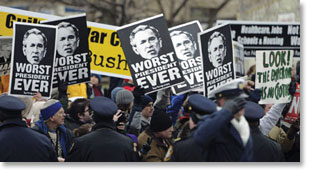
NEW YORK (IPS/GIN) – After a three-year investigation, President Barack Obama’s mantra–“look forward and not backwards”–appears to have trumped the rule of law as a special prosecutor declined to pursue criminal charges against the Central Intelligence Agency operatives involved in the destruction of video recordings of interrogations of “war on terror” suspects.
The human rights community and many legal scholars from both ends of the political spectrum are up in arms about the decision. And they were further angered by the remarks made by former president George W. Bush during recent television and radio interviews promoting his new memoir, “Decision Points.”
For example, Bush admitted to Matt Lauer of NBC’s “Today” program that he authorized the use of waterboarding on two CIA prisoners. He said further that the technique was legal and that he would make the same decision again.
Mr. Lauer then asked him, “Why is water boarding legal, in your opinion?”
Mr. Bush responded: “Because the lawyer said it was legal. He said it did not fall within the anti-torture act. I’m not a lawyer. But you gotta trust the judgment of the people around you, and I do.”
Michael Ratner, president of the Center for Constitutional Rights, spoke to IPS with a hint of despair. “The failure of DOJ (The Department of Justice) to bring criminal charges against the CIA officials who destroyed the tapes of the water boarding of detainees is another awful decision insuring that the torture conspirators, including President Bush, will not be held accountable for their crimes–at least not by the Obama administration,” he said.
“One hope remains,” Mr. Ratner added, “International justice against the torture conspirators that is currently being pursued in the Spanish courts by the Center for Constitutional Rights and others. If I were former President Bush, my next vacation would not be a visit to the Prado.”
Chris Anders, a senior attorney with the American Civil Liberties Union, said, “I find Bush’s remarks about water boarding (in the Lauer interview) more important than the narrow issue of the destroyed CIA tapes. That’s because he confessed to war crimes.”
“Everything in our legal history makes water boarding a crime,” Mr. Anders said. “Bush said he authorized it. What he should know about the rule of law is that no one is above it. Yet Bush doesn’t seem in the least concerned about the consequences of what he is confessing to.”
Criticism of both the special prosecutor’s decision and of Bush’s remarks appeared to come from both the left and the right of the political spectrum.
A well-known conservative lawyer, Bruce Fein, who was a senior attorney in the Department of Justice under President Ronald Reagan, told IPS, “Obama decided against prosecution for the same reason he has desisted from prosecuting former President Bush and former VP Cheney despite confessing to authorizing water boarding: political inconvenience or popular opinion.”
Professor Jordan J. Paust of the Law Center at the University of Houston, author of “Beyond the Law The Bush Administration’s Unlawful Responses in the ‘War’ on Terror,” noted that 29 U.S. legal cases and seven U.S. Department of State Country Reports on Human Rights criticizing the records of other nations affirm that water boarding is “torture,” or at the very least “cruel” and “inhumane.”
Chip Pitts, a lecturer of Law at Stanford University Law School, said, “The crisis of accountability in America is starkly highlighted by the former president’s public confession of recourse to torture and war crimes.”
“But that should not detract attention from the complicity of the current administration, which has resorted to secrecy and backroom deals that blatantly ignore laws–like the Convention Against Torture, in this case–and the administration’s duty to ‘faithfully execute the laws,’ ” he said.
Leon E. Panetta, the CIA director, said in a statement that the CIA was “pleased with the decision” not to bring charges against agency officers involved in destroying the tapes, and that the agency would continue to cooperate with other aspects of the Justice Department’s investigation.












